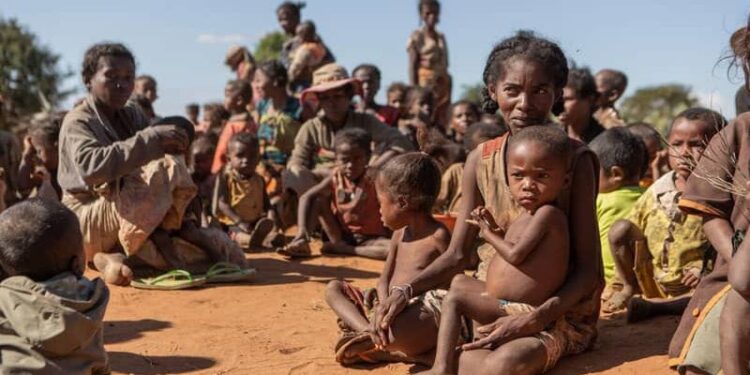Thousands of people in southern Madagascar are already living in famine-like conditions, with many at risk of starving to death.
By Nalova Akua
A devastating famine has hit southern Madagascar in 40 years, putting more than 1.14 million people at risk, according to the World Food Program.
“I met women and children who were holding on for dear life; they had walked for hours to get to our food distribution points,” said David Beasley, the World Food Program executive director, during a visit to a nutrition center in the affected region late last month.
“These were the ones who were healthy enough to make it. Families are suffering, and people are already dying from severe hunger. This is not because of war or conflict; this is because of climate change. This is an area of the world that has contributed nothing to climate change, but now they are the ones paying the highest prize,” he said.
The worst affected region is the Grand Sud, which is experiencing the worst drought since 1981, leading to a near-total loss of crop during the planting season from November 2020 to January 2021.
The World Food Program estimates 14,000 people are already in catastrophic conditions, and the number could skyrocket to 28,000 by October.
It says it needs $78.6 million(some 43.6billion FCFA) to provide life-saving food to thousands of families affected by back-to-back droughts in the island country located in the Indian Ocean, off the coast from southern Africa.
With a population of over 28 million, Madagascar ranks among the most impoverished countries in the world. It was the fourth most vulnerable nation to climate impacts in the 2020 Global Climate Risks Index.
Experts attribute the severe drought ravaging the southern part of the country to climate change.
“Drought is one of the derivables of climate change,” Cameroonian-born Divine Ntiokam, founder and managing director at Climate Smart Agriculture Youth Network Global, told News Upfront.
“Drought means places are dry; there is no water; the soil is cracking; the heat triples. Consequently, the cost of living increases, people don’t longer have access to food, rural women and rural youth are badly affected because agriculture is their main income-generating activity,” said Ntiokam, who is also United Nations Food Systems Summit 2021 Champion.
Severe reduction in staple food production has hit southern Madagascar, forcing many low-income families to forage for wild tubers, leaves, and insects for sustenance.
“Families have been living on raw red cactus fruits, wild leaves, and locusts for months now. This is enough to bring even the most hardened humanitarian to tears,” Beasley said.
Lola Castro, the World Food Program’s regional director for southern Africa, painted a similarly grim picture.
“Hundreds of people have moved from their localities towards urban areas — to get the meager rations of food or nutritious products that we are providing,” she said.
“They have been eating cactus. They mix it with mud because the mud has some sort of nutrients that they are looking for. They are eating sand grass and locusts; they have sold their lands and their houses; they are selling their last assets(pots and pans).”
“We went to some of these areas in September 2020 and realized that climate change, the impact of four years’ consecutive drought as well as the covid-19 that didn’t allow the people to produce, have created this desperation that we are describing.”
Beasley recently met with senior officials in Madagascar, including Prime Minister Christian Ntsay, to identify immediate and long-term solutions to the crisis.
“We work together with the government and other donors and actors to really try to do much more of those people changing a bit their livelihood and doing things that will improve their future,” Castro said.
It is feared a sustained deterioration in food insecurity in southern Madagascar may extend to December 2021.
“We can’t turn our backs on the people living here while the drought threatens thousands of innocent lives. Now is the time to stand up, act and keep supporting the Malagasy government to hold back the tide of climate change and save lives,” Beasley said.
Madagascar is just one in many countries suffering from the effects of climate change, according to Ntiokam.
“What affects Madagascar can happen to any other country –nature is just reacting to what we have done. These are man-made disasters,” he told News Upfront.
“We should not minimize the impact of non-biodegradable plastic waste on the environment. It takes close to 100 years for these plastics to decompose. This causes climate change. One of the solutions to all of this is to plant trees. We also need to build the capacity of people on disaster preparedness,” he said.
In January 2020, the World Food Program warned that 45 million people — mostly women and children — in the 16-nation Southern African Development Community were gravely food insecure following repeated drought, widespread flooding, and economic disarray.
The agency provided lean season assistance to 8.3 million people grappling with “crisis” or “emergency” levels of hunger in eight of the hardest-hit countries: Zimbabwe, Zambia, Mozambique, Madagascar, Namibia, Lesotho, Eswatini, and Malawi.
The World Food Program was awarded the 2020 Nobel Peace Prize for its efforts in saving lives in emergencies arising from conflicts, disasters, and the impact of climate change.
Ntiokam expressed optimism that the maiden United Nations Food Systems Summit 2021 slated for later this year could proffer ways of getting Madagascar out of the present disaster.
“This summit is going to provide solutions to the drought in Madagascar,” he says.
“It is going to be an engagement for the people in Madagascar to live sustainably.”








